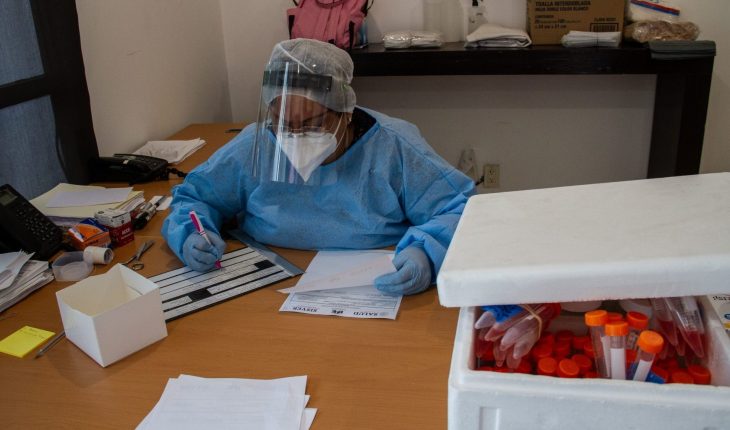The Undersecretary of Health noted that these do not detect a current infection but only if the person has already had the disease, but assured that they are inaccurate and there are still many doubts about its use.
Hugo López-Gatell, Undersecretary for Health Prevention and Promotion, said at the evening conference on COVID-19 that the country’s health authorities have not recommended the use of rapid evidence in this pandemic, even though the Federal Commission for the Protection against Health Risks (Cofepris) has endorsed some.
“Although Cofepris has passed 7 quick tests, there is by no means that they should be used. The country’s health authorities have not recommended that they be used and we recommend, we are close to issuing communiqués, we advise state authorities not to use them because the falsely positive and negative results they can issue could cause confusion, even causing harm to people,” he said.
Quick tests have been at the center of the debate as it has been if the Mexican government should do more tests to confirm positive COVID-19 cases.
State representatives such as Enrique Alfaro de Jalisco and Jaime Rodríguez Calderón, “El Bronco” of Nuevo León ensured that they would use them, and even announced purchases.
Find out: What WHO says about rapid testing for COVID-19 and why it doesn’t recommend them
The Undersecretary of Health has taken advantage of several of his interventions at the Covid conference to ensure that these tests are unreliable.
However, last Monday, Cofepris issued a statement with the Serological Testing List (also known as rapid) Approved as of May 31, 2020 to determine IgG and IgM (antibodies) for COVID-19.
“To ensure the effectiveness of the results of the IgG and IgM serological tests for COVID-19, Cofepris established an evaluation protocol in conjunction with the Salvador Zubirán National Institute of Nutrition and Medical Sciences and TecSalud of Tecnológico de Monterrey,” the statement reads.
These tests are different from those endorsed by the National Institute of Epidemiological Diagnosis and Reference (InDRE) and used in the National Network of State Health Laboratories, known as PCR, which detect, through the analysis of a sample extracted from people’s nose and throat, the genetic material of the virus.
“The person who has Covid-compatible symptoms and has the positive test has confirmation from Covid at that time. Results can take 6 hours to one,” Gatell explained.
Read more: Do they work? Did the US approve them? Alfaro and López-Gatell differ on quick tests for COVID-19
Serological tests, he added, “are so called because they use as a serum specimen, it is the liquid component of human blood and what is sought are antibodies produced in the body against the virus, not molecules of the virus, but antibodies.”
The general interpretation of a positive result in these tests is that the person had in the past, at least ten days ago, but it may be a month ago or up to six 6 months ago, SarsCoV2 virus infection, which causes Covid-19.
From this branch there are two variants, those made in a laboratory, that require protocols and specialized personnel and the rapid tests, those of test strips.
These are usually a plastic device that inside has a strip of textile material with the necessary components to make a chemical reaction that detects antibodies in human blood.
“Molecular testing (PCR) is the gold standard, it is the right test to identify at the time that someone has SARS-Cov2 virus infection. Serologicals are in a great scientific debate around the world, because knowledge of the rate at which antibody concentrations in the blood increase, and whether or not the presence of antibodies means biological protection is still a source of uncertainty.”
You may be interested: Quick tests are not endorsed by FDA or other competent authority, says Lopez-Gatell
Lopez-Gatell noted that it is false that these tests should necessarily be used in the new normal to find out who already had the infection.
“No one in the world who has serious scientific notion has raised that they are indispensable to the new normal. There is a great expectation that we would all like, the general population, government, companies, to have a diagnostic instrument that would allow us to recognize whether or not we already had the infection because we would all feel calmer to know ah, I already had it, maybe I did not even realize but I am already protected.
But there is no science in that aspiration, this idea that has been called vernacularly, in an aspirational wayl: health passport or immune passport, because it resembles saying, I am already protected, I can be in the public square. I wish we had this diagnostic instrument, but no, today 5 June 2020 I can say with all peace of mind and confidence that this is not the case.”
The official explained that serological tests perform very poorly. “The probability of being positive when a person has the disease or the history of infection is very low, from 30 to 50 at most to 60% and that’s why the US Centers for Disease Control says it’s like blowing a fly.”
Conclusion, he emphasized, “although Cofepris has passed 7 quick tests, there is no way that it should be used and the country’s health authorities have not recommended that they be used.”
What we do in Animal Político requires professional journalists, teamwork, dialogue with readers and something very important: independence. You can help us keep going. Be part of the team.
Subscribe to Animal Político, receive benefits and support free journalism #YoSoyAnimal.
translated from Spanish: Health calls not to use quick cofepris-backed tests
June 6, 2020 |





